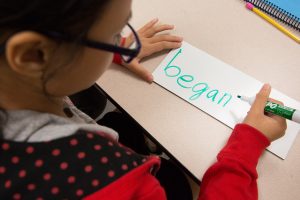Summer Reading Program Pilots New State Law
Summer school won’t be an option for 3rd graders who are reading below grade level after the 2016-17 school year. It will be a state law.
That’s the impetus for a program that’s being piloted in select school districts around Iowa this summer, including DMPS. Dr. Deborah Reed is the Director of the Iowa Reading Research Center and an Associate Professor at the University of Iowa and on Thursday she visited the Intense Summer Reading Program (ISRP) that’s underway at Capitol View, Edmunds, Monroe, and Park Avenue elementary schools to get a sense of how it’s working.
Students from 14 district elementary schools were eligible to participate at one of the four sites, according to Noelle Tichy, Executive Director of Teaching and Learning for DMPS.
The mandated summer school program must be offered for a minimum of 75 hours, and research-based literacy interventions will be provided in small classes (15 students maximum) taught by licensed teachers. Students who are not proficient in reading by the end of third grade must attend at least 90% of the summer school program to be promoted to fourth grade, barring a good-cause exemption.
The pilot program was funded primarily by private donations but districts around the state are counting on the legislature to provide funding for 3rd grade summer school when it becomes mandatory next year. The Iowa Department of Education has requested $9 million for school districts to fund the programs and Governor Branstad has pledged to ask legislators for the money when the 2017 legislative session convenes in January.
“The administrators, faculty, and staff have been working incredibly hard to put together an outstanding program and also meet the very rigorous requirements of our research study. We have three different types of curricula being studied in ten classrooms of DMPS third graders experiencing reading difficulties,” read an e-mail that Reed sent to state legislators in central Iowa inviting them to tag along on Thursday’s tour. “In addition, the district is hosting two classes from the Oakridge Neighborhood Association, which also has shown tremendous commitment to getting students involved and making the ISRP a success.”
Unfortunately, none of the lawmakers joined her.
Reed was encouraged by what she saw and heard although pre- and post-test data won’t be available for analysis until after the program, which began on June 13 and runs through next Friday, July 15, is completed. Classes meet every morning from 8:00 until noon.
“We hope to be able to provide district-specific feedback,” Reed said at Capitol View. “We are also doing behavioral assessments in addition to the literacy testing.”
In one of the classrooms at Park Avenue progress was palpable. While teacher Fallon Parker worked with a small group of students at one table two other groups were working independently, tuned in via headphones and laptops to a literacy software program called Scholastic BookFlix. The highly concentrated atmosphere was interrupted momentarily when one boy exclaimed “YES!” and thrust his arms in the air upon completion of an exercise. At the next table another boy cracked his knuckles before attacking his keyboard with both hands.
Parker said she’s been pleased with the kids’ level of engagement. “I just remind them every morning that the swimming pools don’t open until noon anyway,” she said with a smile.
Next summer, when 3rd grade summer school is required for students identified as persistently at-risk, attendance will be a critical component. There will not be a pass/fail level of progress but the 90% attendance threshold is a provision of the law. That makes one aspect of this summer’s pilot a red flag, at least at the Capitol View site where Principal Marsha Kerper reported that most of the classrooms had less than 15 students, the maximum allowed under the law.
“For whatever reason, there have been families that signed their students up but didn’t follow through,” she said. Starting next summer that will result in a student being retained, or held back, in 3rd grade.
Capitol View derives its name from proximity to the golden dome of the statehouse that looms just a couple of blocks away. If the folks who work there get the job done next winter it will enable more students to do theirs at this school and others around the district next summer.





